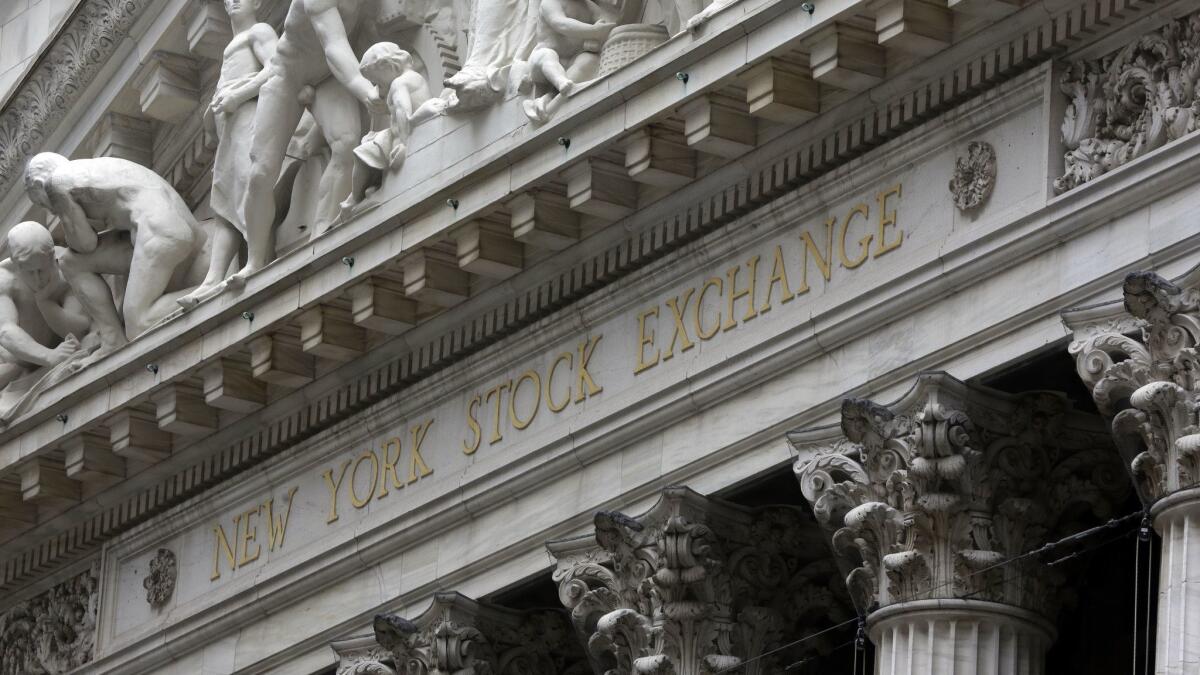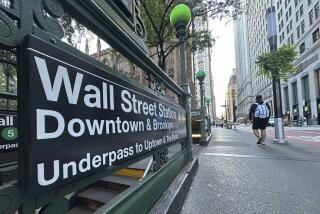Strong gains for technology stocks send Wall Street higher

Stocks marched higher again Monday as Wall Street extended its gains from last week’s rally, the market’s best in three months.
The Standard & Poor’s 500 index rose 1.6%, following up on strengthening in stock markets around the world. Big Tech stocks, including Apple and Microsoft, powered much of the gains. Their businesses have proved to be practically impervious to the pandemic, unlike companies that would benefit from a strengthening economy.
The market’s latest upward push came as Wall Street appeared to largely shrug off the latest signs that Democrats and Republicans are no closer to reaching a deal on more aid for the economy, which remains hobbled by the pandemic. Over the weekend, Democratic House Speaker Nancy Pelosi criticized the latest offer from the Trump administration on a stimulus package as “one step forward, two steps back,” while the president’s fellow Republicans called it too expensive.
Investors may be betting that Congress will deliver a more generous aid bill after the election, should Democrats regain the majority in Congress, as some polls suggest.
The S&P 500 rose 57.09 points to 3,534.22. The benchmark index is on a four-day winning streak and is now within 1.4% of its all-time high set Sept. 2. The Dow Jones industrial average climbed 250.62 points, or 0.9%, to 28,837.52. The Nasdaq composite, which is heavily weighted with technology stocks, gained 296.32 points, or 2.6%, to 11,876.26.
Apple climbed 6.4% and alone accounted for a quarter of the S&P 500’s rise. The iPhone maker also was the index’s biggest gainer. Amazon rose 4.8%. Both companies have events coming up this week, with Apple expected to unveil its latest batch of iPhones on Tuesday and Amazon holding its Prime Day on Tuesday and Wednesday.
Many industries have taken a severe hit, but the state’s housing market should enjoy a quick recovery, a UCLA forecast predicts.
Microsoft rose 2.6%, Facebook added 4.3% and Google’s parent company gained 3.6%.
The Russell 2000 index of small-cap stocks, which tends to move more with expectations for the economy’s strength than Big Tech companies, notched more modest gains than the rest of the market. The index picked up 11.51 points, or 0.7%, to 1,649.05.
Monday’s gains add to last week’s 3.8% rally for the S&P 500, which came amid a dizzying 360-degree spin on expectations for Congress and the White House to be able to deliver more aid for the economy.
President Trump said early in the week he’d put a halt to negotiations on stimulus, even though economists and the chairman of the Federal Reserve say the economic recovery probably needs it. He then backed a set of more limited programs before admonishing negotiators at the end of the week to “Go Big!” His administration unveiled its latest, increased proposal to House Democrats, valued at about $1.8 trillion, but it was rejected by Democrats over the weekend.
Investors have been agitating for more stimulus since the expiration of extra unemployment benefits for laid-off workers and other support for the economy approved by Congress earlier this year. Even if Washington can’t deliver the aid soon, some investors have been building up their expectations that it may arrive in 2021.
Rising poll numbers for Democrats are lifting the odds for a sweep of the White House, Senate and House of Representatives. If that were to happen, investors say, it would also increase the likelihood for a big stimulus package after the election. That could offset the drag on corporate profits that investors expect a Democratic-controlled Washington would create through higher taxes and tighter regulations.
This week also marks the start of earnings reporting season for big U.S. companies, when chief executives will tell investors how their companies fared from July through September. Analysts are forecasting another quarter of weaker profits, with S&P 500 earnings expected to be down 20.5% from a year earlier, according to FactSet.
But that’s not as bad as analysts were forecasting a few months ago, and it’s not as bad as the 31.6% drop that S&P 500 companies reported for the spring quarter. As widespread lockdowns eased across the country, companies have been able to feel a bit of increasing momentum.
In European markets, indexes rose in France and Germany but slipped in Britain. Asian markets closed broadly higher, except in Japan, where they fell slightly.
U.S. bond trading was closed for Columbus Day.
More to Read
Inside the business of entertainment
The Wide Shot brings you news, analysis and insights on everything from streaming wars to production — and what it all means for the future.
You may occasionally receive promotional content from the Los Angeles Times.











